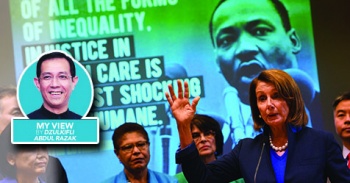US tastes its own bitter medicine
Professor Tan Sri Dato' Dzulkifli Abdul Razak
My View - The Sun Daily
January 17, 2017

IN a few days, the US is expected to undergo some kind of change that it has not seen or imagined. This coincides with the inauguration of Donald John Trump as the 45th president of the United States, someone whom the incumbent described as "uniquely unqualified" for the office. This turn of events is indeed "unpresidented" (sic) – to emulate Trump's tweet.
Like President Obama, many will find it difficult to adjust if not accept the new leadership, as indicated from the "Not my president" marches throughout the country. The protesters are no longer limited to just the Mexicans and Muslims who were among the first to be singled out.
In some cases, the younger disillusioned protesters turned violent. Now there are many others coming out to condemn Trump's litany of crude comments.
Effigies have been burnt, intersections blocked and property destroyed. Buildings and facilities bearing Trump's name turned out to be magnets attracting the protesters. Trump supporters have labelled the protesters as "losers" and "crybabies".
Never before have Americans been so critical of an elected president. This maybe a rarity for the US but not in other parts of the world, especially in the Global South where the "Not my president"-like sentiments are more common.
This is partly because elections are often a challenge where the population are not well versed with process and are exposed to vulnerabilities, manipulation and unfairness. Even when a leader is elected democratically, chances are the results will be tempered and a "puppet" installed by so-called "superpowers". It is hardly surprising to learn that the US is the foremost culprit in this case as veteran journalist Eric Margolis has commented.
He wrote recently how in 1946 "the US and the Vatican financed Italy's right-wing Christian Democratic Party" and helped it to win three national elections "even though it was heavy with former fascists and Sicilian bandits."
In 1949, the US organised "the overthrow of Syria's government" while in 1953 it colluded with Britain "to overthrow Iran's popular democratic government."
The next year, it was the government of Guatemala, Lebanon in 1958, three years later, the Bay of Pigs invasion and over 50 attempts to assassinate Cuban president Fidel Castro.
The list goes on and on, where the developing world became the US playground to exercise its hegemonic power to rule the world, including of late, the use of soft power ranging from arm-twisting to golfing.
Margolis encapsulates the situation with an apt analogy: "Regime change has been as American as apple pie." Even when the local population have no appetite for such a pie, it is rammed down their throat.
Here is where the (anti-)Trump-like experience resonates beyond just the US borders and its citizens.
By now, hopefully, the Americans are beginning to sense how it feels to be governed by leaders who are not of their choosing, democratically or otherwise. So too how they have humiliated other citizens by installing US "puppets" and diminishing all hope.
The Americans are beginning to appreciate the desperation when the story that Russians were "meddling" with the US elections surfaced. If the US has been doing this habitually worldwide, why not the others too? Margolis, however, says based on his journalistic experience: "If there was any foreign meddling, it came from a Middle East ally, not Russia"– an observation made more pertinent following UN Security Council's Christmas Eve decision on the settlement issue in occupied Palestine.
So as we welcome the new US president, we also warmly welcome the American citizens to the "Third World" experience where leaders are the people whom the citizens love to hate.
The only difference perhaps is that the Americans have chosen to do this onto themselves by "shortlisting" two "unsuitable" presidential candidates from a community of the world's most advanced nation. Whereas for the other countries, they are burdened with the choice of "unsuitable" candidate(s) as dictated by the US against their own free will.
But all the same, the US and its citizens now have to swallow their own bitter medicine. In doing so it is fervently hoped that the "medicine" will have an effect so strong to put a stop to some of its sickly habits of trying to "make America great again" at the expense of others.
Given that the new president has demonstrated to be "different" in so many ways, he will definitely score high points to reject the old diehard practices of trumping others just so that America can be exceptional at all cost.
